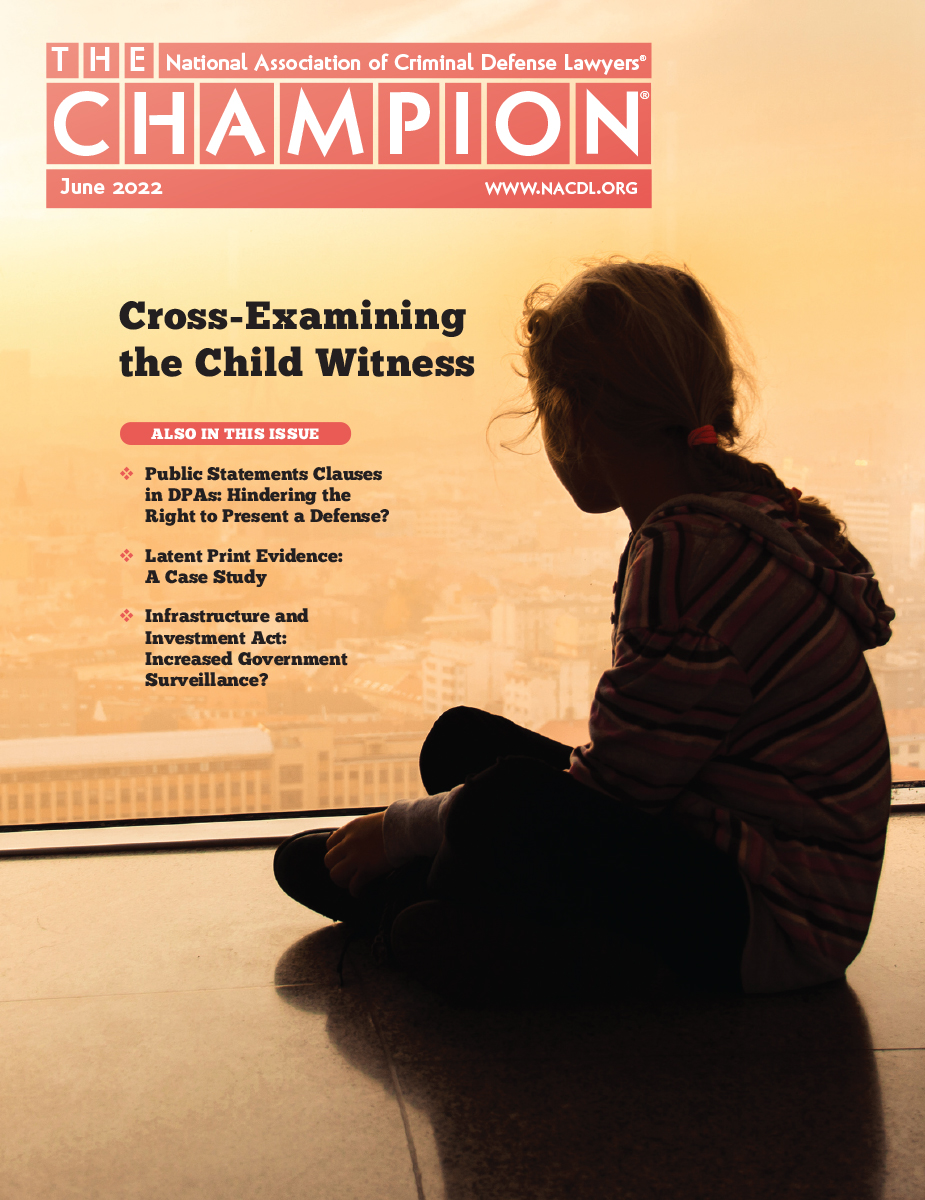June 2022

How can defense counsel conduct an effective cross-examination of a child?
Articles in this Issue
-
Advancing Forensic Science in Criminal Justice: Latent Print Evidence — A Case Study
What are the problems with fingerprint analysis? Justin Fahringer describes a recent Daubert hearing that included testimony by latent fingerprint examiners from two law enforcement agencies. The testimony revealed that many law enforcement agencies that employ latent print examiners have struggled to evolve and have continued to utilize stale and unreliable methods.
-
Affiliate News
What events are NACDL affiliates hosting this month? Find out here.
-
Biden’s Big Brother Hits the Road
How the Infrastructure and Investment Act Creates the Specter of Increased Government Surveillance
The Infrastructure Investment and Jobs Act contains provisions addressing driving-related public safety issues, including multidrug impaired driving. The legislation, among other things, requires that drunk and impaired driving prevention technology become standard equipment on all new passenger motor vehicles. While many people have lauded these provisions, a plausible unintended consequence of this technology is the very real specter of broadly increased governmental surveillance.
-
Book Review: The Lifer and the Lawyer by George Critchlow with Michael Anderson
This month Susan Elizabeth Reese reviews The Lifer and the Lawyer: A Story of Punishment, Penitence, and Privilege by George Critchlow with Michael Anderson.
-
Book Review: The Three Death Sentences of Clarence Henderson by Chris Joyner
This month Jon M. Sands reviews The Three Death Sentences of Clarence Henderson: A Battle for Justice at the Dawn of the Civil Rights Era by Chris Joyner.
-
Book Review: When Machines Can Be Judge, Jury, and Executioner by Katherine B. Forrest
This month Robert M. Sanger reviews When Machines Can Be Judge, Jury, and Executioner: Justice in the Age of Artificial Intelligence by Katherine B. Forrest.
-
Cross Country: ‘But’ — The Creator of Doubt
“But” is a word that portends disappointment in some aspect of the prosecution’s case, and disappointment can lead to reasonable doubt.
-
Cross-Examining the Child Witness
Cross-examining children is a potential minefield because the cross-examiner must tread with care yet with a deliberate aim, all while maneuvering across a field that is unfairly stacked against the defense. Andres R. Guevara discusses the pitfalls and offers strategies for the successful cross-examination of a child.
-
From the President: Operation Lone Star: Texas-Sized Abuse of Criminal Laws to Punish Immigrants
on the Border
Operation Lone Star, a Texas effort to secure the border, leverages the trial penalty to secure plea bargains.
-
Getting Scholarship Into Court Project
The “Getting Scholarship Into Court Project” brings helpful law review articles and other writings to the attention of criminal defense attorneys. The project’s purpose is to identify scholarship that will be especially useful to courts and practitioners. Summarized on this page are articles the project’s advisory board recommends that practicing lawyers take the time to read. To recommend articles for this column, contact Professor Jenny Carroll (jcarroll@law.ua.edu).
-
NACDL News: A New Era of Overcriminalization and Mass Prosecution
NACDL News for June 2022
-
NACDL News: NACDL Again Calls on DOJ Leadership to Address Inhumane Conditions at Rikers Island
NACDL News for June 2022
-
When Silence Is Not So Golden
Public Statements Clauses and Interference With a Defendant’s Right to Present a Vigorous Defense
Andrew S. Boutros and Jay Schleppenbach discuss the proliferation of clauses in corporate deferred prosecution agreements and settlement agreements barring company representatives from publicly denying the factual basis of the plea or deferred prosecution agreement. Do these so-called “public statements clauses” interfere with the right to present a defense?
